Please tap your screen or hover over an image to pause the slides.
-

The Brown Foundation continued to partner with Southern University throughout all of 2025, proudly issuing, in the aggregate, $150,000 in research support awards through principal investigators Miriam Contin, MV, Ph.D. and Marlin Ford, Ph.D. for their respective research programs. Additionally, the Foundation launched an entirely new research program with Southern University in the fall of 2025 and issued lead in awards for the research undertaken by (a) Jodi Morton, Ph.D. in Fennel Supplementation for Reproductive Development, Breeding, and Pregnancy Outcomes in Swine, (b) Joshua Reason in Establishment of a Wine Analytical Laboratory to Enhance Grape and Wine Research at Southern University, and (c) Michael Walker in Preliminary Investigation into the Medicinal and Agricultural Potential of Turmeric. In addition to the lead in awards issued in 2025, one of the above three named researches will win $100,000 in support for their lab at Southern from the Brown Foundation in 2026.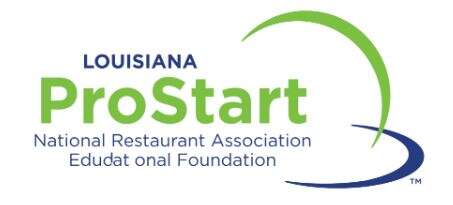
The Brown Foundation is deeply honored to note its continued affiliation with the LRA in rolling out ProStart® throughout all of Louisiana. ProStart® is a nationwide, two-year, culinary arts and restaurant management program for high school students. It is one of the most effective industry-supported career and technical education programs in the nation, empowering students to achieve long term, successful careers in the restaurant and foodservice sector. Students who have completed the requirements of the ProStart® program are awarded an industry-recognized certificate – the ProStart® National Certificate of Achievement. All schools that receive funds as part of either our Spring or Fall 2025 School Support Fund will be required to submit a report with receipts to document how funds were utilized. In 2025 the Brown Foundation sponsored 23 schools in the Spring of 2025 and then 50 schools in the Fall of 2025. This has been one of our fastest growing programs in recent memory and we are pleased to announce that as of December 8, 2025, we have officially renewed the program through calendar year 2027. -

In November of 2025 – following the receipt of a fantastic impact report on awards we made in 2024 & 2025 - the Brown Foundation proudly committed $60,000 to undertaking two additional years of support to the Greater New Orleans Development Foundation for their HBCU Entrepreneurship Internship Program. Through this program selected Juniors and Seniors from SE Louisiana regional HBCUs— Xavier University of Louisiana, Dillard University, and Southern University at New Orleans - are paired with startup companies in the region who are seeking qualified and diverse talent for a paid summer internship. The goal of the program is to bring together the local startup community to train the next generation of successful entrepreneurs, inspire students to become innovative change-makers, and increase the innovation capacity of regional startup firms. This paid internship introduces the students to the entrepreneurial mindset and provides hands-on training in high-impact, real-world entrepreneurship settings. Participants will develop creative capacity, entrepreneurial confidence, mentorship, and acquire the necessary skills to build scalable startups that solve real problems. Each internship cohort launches as a week-long program to provide students with an interactive startup experience that will equip students with what it takes to be a successful startup founder. The week starts off with a two-day program titled The HBCU Startup Internship Workshop presented by The Idea Village, which will provide information on the overall startup ecosystem, resources, and exposure to founders. Following the The HBCU Startup Internship Workshop there will be a three-day training at OHUB where interns will develop a mock product or service and then pitch it on the final day—“Mock Demo Day.”
Service Learning is the Brown Foundation’s oldest program and one we have proudly supported every year for more than three decades as we have issued more than $8,356,270 in the aggregate in awards through this program since it launched in 1993. Service Learning gives students the opportunity to meet community needs through hands-on experiences that tie classroom curriculum to service. Service learning is a teaching strategy that allows students to address real-world problems within their communities as part of their academic studies. This instruction method requires ongoing reflection exercises that bridge the gap between theoretical (classroom studies) and practical (experiential) knowledge. In the end, students understand the relevance of what they are learning and experience how they can make an impact. Our service learning program adheres to the National Youth Leadership Council (NYLC) definition and standards of Service Learning. All funded service learning projects must include classroom learning, a partnership with a service organization, and follow the IPARD (Investigation, Preparation, Action, Reflection, and Demonstration) model developed by NYLC. In 2022 we began undertaking our service learning initiatives in collaboration with the STEM Library Lab, an organization we have mentored for many years in the service learning field. In 2025, we approved $267,404 in grant awards across fifty (50) different K-12 schools as we partnered with ninety-three (93) different classrooms. -
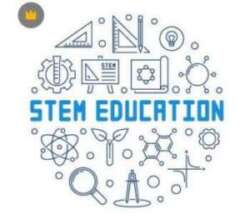
In August of 2025, the Brown Foundation issued an aggregate total of $399,893 in grants to 22 different organizations out of our SupportSTEM program. Since we launched this forward looking program in 2018, we have issued $2,332,960 in total awards out of our SupportSTEM program for STEM curriculum implementation or STEM instruction support for K-12 schools, non-profit groups, universities and technical colleges. Examples of the 2025 awards under this program included Nicholls State University which received $20,000 in support for their teacher training and workshop program focused on 2nd-6th grade classroom STEM programs and Anna’s Place NOLA for their partnership with NASA, Delgado, and Loyola. The Foundation is pleased to announce that we have renewed the SupportSTEM program again for 2026 and we are enthusiastically accepting applications from now through March 15, 2026 (all applications will be reviewed simultaneously for this competitive program). Please visit our education department section of this website for more information.
With $200,000 support from the Brown Foundation issued in December of 2025, Duke University – through the work of principal investigators Tong Qiu, Bin Mei, Ram Oren, and Sari Palmroth - is advancing research on science-based approaches to wildfire mitigation in the context of a changing climate. The funded project evaluates the economic and environmental impacts of alternative forest management strategies, comparing traditional, fixed schedules for thinning and prescribed burning with a more adaptive, data-driven approach. By assessing costs and benefits—including wildfire risk reduction, public health impacts from smoke, ecosystem recovery, and avoided damage to communities and infrastructure—the research aims to identify more efficient and resilient fuel treatment strategies. This work will generate evidence-based insights to inform wildfire policy and management decisions, supporting healthier forests, safer communities, and more cost-effective approaches to wildfire mitigation in Louisiana and other fire-prone regions. -

In April of 2025 we provided $193,145 in funding for nineteen summer camp programs that offer camp to children with special needs, promote STEM, advance learning and leadership, prevent summer learning loss, incorporate academic enrichment activities and/or communicate with and engage parents and guardians before, during and after camp in the curriculum. We originally launched our summer camp program in 2019 with the assistance of various K-12 educational specialists. Though COVID-19 made the first couple years of this program challenging for several reasons, 2025 marks the sixth successful year of our Summer Camp Program. date, over eighty organizations have received Summer Camp support totaling $909,221 in the aggregate since the start of this decade. The Summer Camp Program will resume for a seventh consecutive year in 2026, so please visit our Summer Camp webpage within the Education section of this site during the stated application period (which is December 2025 and January 2026). Organizations that have received funds through this program for two years will be rotated out of consideration so that there is budgetary room for new qualified applicants in this competitive program.
In May 2025, The Joe W. & Dorothy Dorsett Brown Foundation issued $20,000 in grant support for the 2025-2026 school year at St. Michael Special School. The Brown Foundation has now sponsored programs with St. Michael Special School for 26 years going back to 1999 totaling $309,000.00. Since 1965, St. Michael Special School has educated students aged six through adulthood with intellectual and developmental disabilities (i.e. those with mild to moderate disabilities, including autism, ADHD, developmental delay, traumatic brain injury, multiple disabilities, and other health impaired). The curriculum includes religion, reading, language arts, math, science, social studies, computer, creative arts, culinary science, vocational training, independent living, community integration, industrial arts, and music. The school is unique in that it provides for the development of the whole child—academically, physically, emotionally, and spiritually—regardless of his or her disability. Purposeful academics are geared to individual needs in an environment where every child participates in a variety of meaningful activities. Interpersonal skills and social responsibility are consistently reinforced. Extracurricular activities include speech therapy, music therapy, adaptive physical education, club participation based on interest, student council, sports, cheerleading, and various inclusive activities with respective peer groups. -
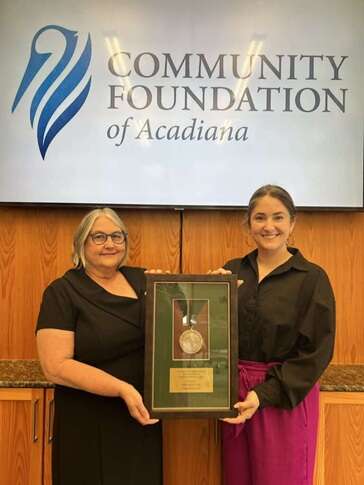
Everyone wants to feel normal. To have a sense of belonging and community. To participate in the same activities and have shared experiences with others. For the 40,000 kids born with heart conditions every year, finding others who can relate to testing, risky procedures, even open-heart surgery—sometimes more than once—can be difficult. For their families, watching a loved one struggle with the physical and emotional scars of being different while trying to make sure they’re safe and cared for presents its own unique challenges. Camp Bon Coeur opened in 1985 as Camp Good Heart! to give children with heart defects a place where they can “just be a kid”. In 1999, Susannah Craig joined the team and mission of Camp Bon Coeur, which translates to Camp Good Heart, where special need kids can attend a summer camp and meet other children who have experienced the same emotional and physical challenges of growing up with a heart that has needed mending. This is often a first-time experience for these children, to meet other children like them. Over the years Camp Bon Coeur has grown from a Summer Camp to include a weekend Family Camps, monthly Support Groups, and outings for families of children and adults with congenital heart defects (CHD). They are the only program of this kind in Louisiana and remain among a small handful of programs nationwide dedicated specifically to Heart kids. Each year there are an estimated 42,000 children that are born with heart defects. There are twice as many children with heart defects as with any other childhood disease. There is no cure for heart defects; they are lifelong conditions that often require multiple surgeries, ongoing procedures, and heart-related illness. Camp Bon Coeur gives these children a place to grow socially and emotionally in a very safe and supportive environment. The Brown Foundation simply couldn’t be prouder of Camp Bon Coeur. We have supported this organization since 1995 and have given the organization an aggregate total of $511,000 in grant support over the years. Starting in 2024 Camp Bon Coeur has found a new home with Ochsner, a simply fantastic match of two fabulous non-profit organizations.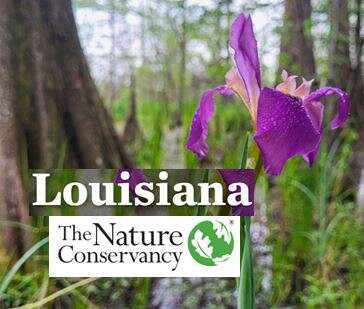
The Nature Conservancy (TNC) is the largest global environmental nonprofit working to fulfil its mission to create a world where people and nature thrive. For over three decades, the Louisiana chapter of this prestigious organization has built a strong foundation in sustainable land and water conservation spanning over 300,000 acres of conserved land. Recently, the Brown Foundation issued $50,000 in grant support to TNC Louisiana for a program titled Designing a Resilient Louisiana. This project aims to advance their work in Louisiana’s longleaf and riparian forests and grasslands, in the Mississippi River Basin and in other coastal tributaries, and in other low elevation areas of Louisiana to make a meaningful difference in restoring floodplains, implementation of nature-based solutions and design river management strategies. Programming will integrate TNC's most innovative priority mapping tools with their new conservation vision to research avenues, increase biodiversity and restore landscapes across the state. Since 1994, the Brown Foundation's support of TNC's efforts have totaled $1,882,335.00. -

On May 8, 2025 at the Louisiana State University Lod Cook Alumni Center in Baton Rouge, we proudly presented Jennifer Maggio with The Incomparable Service Award. For her efforts and dedication as founder and CEO of The Life of a Single Mom® (“TLSM”), her non-profit received $15,000 in grant support. TLSM is an award-winning, national nonprofit that exists to see that no single mom walks alone. TLSM achieves that mission by improving the lives of single mothers through support groups and life skills education in three core areas: Parenting, Finances, and Health & Wellness. Their programs focus on transitioning single mother-led families from survival and stabilization to thriving, and educating mothers in critical areas while teaching them to form a healthy support network. Their original single mom support group model was established in January 2007 and has served as a catalyst to launch support groups in 2,000+ communities across the U.S. On average, 150,000 single mothers connect to TLSM programming annually. TLSM serves as an information gateway that connects single moms to their peers, life skills education, and resource identification for long-term improved outcomes. Jennifer Maggio is an author to 5 books, a national speaker, business consultant, CEO of a national nonprofit, vocal pro-lifer, wife, mom, and above all else, a Jesus lover. Her personal journey through homelessness, abuse, and years of single parenting has been used to inspire over 1,000,000 single mothers’ new hope in Christ, securing hers as one of the largest single moms’ ministries in the nation.
In December of 2024, the Joe W. and Dorothy Dorsett Brown Foundation’s Shelter and Food Security Program awards were issued to approved applicants. The 32 organizations participating in the program received an aggregate total of $827,500.00 in grant support for their respective efforts to address homelessness, offer support and rehabilitative services to individuals suffering a translational homeless crisis, and provide widespread access to food across the state of Louisiana in the parishes of Jefferson, Orleans, Lafayette, Morehouse, Rapides, Terrebonne, Webster, Caddo, Avoyelles, Jefferson Davis, Lincoln, Loreauville, Beauregard and Hinds County, Mississippi. Since this program’s 2020 pilot year, $2,660,500 as been granted to 88 non-for-profit organizations and pantries striving to alleviate the most aspects of human suffering for individuals, families and communities. We are so thankful for the impactful partnerships with Second Harvest Food Bank’s South Louisiana partners, the Food Bank of Central Louisiana, the Food Bank of Northeast Louisiana and the Food Bank of Northwest Louisiana. The Shelter and Food Security Program will run for a sixth session with the Joe W. and Dorothy Dorsett Brown Foundation in 2025. The application window for this program closes on August 31, 2025. Organizations must be pre-approved to apply. Please send in an LOI pursuant to our LOI protocols found elsewhere on this website. Food pantries may qualify for support for one year from this program. Organizations, other than food pantries, may qualify for support from this program for up to two years. -

The Brown Foundation is deeply honored to note its affiliation with the Louisiana Restaurant Association in developing the ProStart® throughout all of Louisiana. ProStart® is a nationwide, two-year, culinary arts and restaurant management program for high school students. ProStart reaches over 200,000 students in 2,000+ high schools across all 50 states, Guam, and the District of Columbia. It is one of the most effective industry-supported career and technical education programs in the nation, empowering students to achieve long term, successful careers in the restaurant and foodservice sector. Students who have completed the requirements of the ProStart® program are awarded an industry-recognized certificate – the ProStart® National Certificate of Achievement. To obtain a COA, students must pass both ProStart® exams, master foundational skills, and work 400 mentored hours in the industry. Students who receive the certificate are eligible for NRAEF scholarship opportunities and course credits at some of the country’s leading hospitality and culinary arts colleges and universities. All schools that receive funds as part of either our Spring or Fall 2024 School Support Fund will be required to submit a report with receipts (and registration documentation if they request funding for a scholarship to attend a session of the NRAEF's professional development) to document how funds were utilized. End of semester reports for Spring 2024 are due by September 10, 2024 and Fall 2024 are due by January 10, 2025. The Brown Foundation sponsored 22 schools in the Spring of 2024 and then 34 schools in the Fall of 2024. This has been one of our fastest growing programs in recent memory and we are pleased to announce that as of November 7, 2024 we have officially renewed the program for both calendar year 2025 and 2026.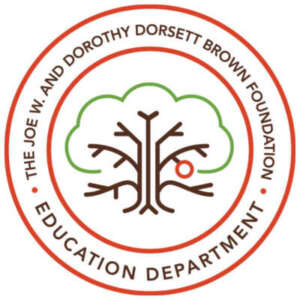
Service Learning gives students the opportunity to meet community needs through hands-on experiences that tie classroom curriculum to service. Service learning is a teaching strategy that allows students to address real-world problems within their communities as part of their academic studies. This instruction method requires ongoing reflection exercises that bridge the gap between theoretical (classroom studies) and practical (experiential) knowledge. In the end, students understand the relevance of what they are learning and experience how they can make an impact. The Joe W. and Dorothy Dorsett Brown Foundation Service Learning Program is the longest standing program in our organization’s history as we have supported service learning projects dating back to 1993. Our service learning program adheres to the National Youth Leadership Council (NYLC) definition and standards of Service Learning. All funded service learning projects must include classroom learning, a partnership with a service organization, and follow the IPARD (Investigation, Preparation, Action, Reflection, and Demonstration) model developed by NYLC. In 2022 we began undertaking our service learning initiatives in collaboration with the STEM Library Lab, an organization we have mentored for many years in the service learning field. In 2024, we approved $325,696 in grant awards across sixty-six (66) K-12 schools through our service learning program. This is the highest amount of awards we have issued through our service learning program since 2011 and we are pleased to say this program has fully recovered from COVID-19 nearly shuttering it entirely. -

In August of 2024, the Brown Foundation issued an aggregate total of $397,085 in grants to 24 different organizations out of our SupportSTEM program. Since we launched this forward looking program in 2018, we have issued $1,933,067 in total awards out of our SupportSTEM program for STEM curriculum implementation or STEM instruction support for K-12 schools, non-profit groups, universities and technical colleges. Examples of the 2024 awards under this program included YouthForce NOLA program titled Scaling Educator Externships in Local STEM Industries, that received $22,500 and in support and the GNO STEM Initiative, that received $20,000 in support of their program titled GNO STEM Summer Teacher Professional Development 2025. The Foundation is pleased to announce that we have renewed the SupportSTEM program again for 2025 and we are enthusiastically accepting applications from now through March 15, 2025 (all applications will be reviewed simultaneously for this competitive program). Please visit our education department section of this website for more information.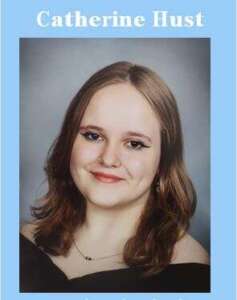
Congratulations to the Brown Foundation Emma Noether Award Program 2024 Gold Medalist, Catherine Hust. Catherine will receive up to $75,000 dollars in scholarship support should she timely pursue post graduate studies in a qualified (non-clinical) research field. Catherine is a senior at Petal High School in Petal, Mississippi, and plans to attend the University of Southern Mississippi. While there, her goal is to acquire a bachelor's degree in physics. She then plans to attend Embry- Riddle Aeronautical University in Daytona Beach, Florida, to earn her PhD in astrophysics. From an early age, she has been infatuated with the concept of science, leading her to pursue a high school career deeply rooted in STEM. At Petal High School, she completed several college level math courses including Dual Credit Trigonometry and Dual Credit Calculus. She also took part in a two-year Polymer Science CTE course. Catherine is the Vice President of her school’s Mu Alpha Theta chapter as well as the art officer for her school’s Interact Club, who, recently, helped construct clean water wells in Africa. Her passion for STEM aside, she also harbors a vibrant interest in art. During her high school career, she painted two large murals for her local primary school. In her free time, Catherine enjoys writing, painting, and star gazing. -

Congratulations to the Brown Foundation Emmy Noether Award Program 2024 co Silver Medalist, Michelle Brown. Michelle will receive up to $25,000 in scholarship support should she timely pursue post graduate studies in a qualified (non-clinical) research field. Michelle Brown is a graduating senior at Ocean Springs High School in Ocean Springs, Mississippi. She will be attending Mississippi State University for Chemical Engineering. Michelle has a passion for the environment and plans to work for the Environmental Protection Agency (EPA) after graduate school. With an internship at Chevron, she learned about the chemical processes used to locate and transport oil. She wants to make these processes more energy and fuel efficient. She has a passion for running, becoming regional champion and All-State runner in cross country. She is a founding member of the NHS tutoring organization. When she is not studying in the International Baccalaureate program, she can be found in the theatre making costumes or with the local band playing guitar.
Congratulations to the Brown Foundation Emmy Noether Award Program 2024 co Silver Medalist, Kathy Hu. Kathy will receive up to $25,000 in scholarship support should she timely pursue post graduate studies in a qualified (non-clinical) research field. Kathy is a senior at the Episcopal School of Baton Rouge and plans to attend MIT in the fall to study Computer Science, Economics, and Data Science. During high school, she conducted statistical research at Pennington Biomedical Research Center on the heavy prevalence of childhood obesity in the US and the relationship between diet, obesity, and cardiometabolic risk among Louisiana adolescents. She presented this research at the Louisiana State Science Fair and Obesity Week 2023 and plans to continue pursuing public health. At Episcopal, Kathy is the President of Mu Alpha Theta, Science Club, Science Olympiad, and Beta Club, and she is Co-Editor-in-Chief of Troubadour, her school’s literary magazine. She was also recently selected as a 2024 U.S. Presidential Scholar. In her free time, Kathy enjoys playing classical piano and the clarinet, reading, scrapbooking, and biking around her neighborhood. -

The U.S. has sustained 400 weather and climate disasters since 1980 where overall damages/costs reached or exceeded $1 billion (including CPI adjustment to 2024). The total cost of these 400 events exceeds $2.785 trillion. In 2024 (as of November 1), there have been 24 confirmed weather/climate disaster events with losses exceeding $1 billion each to affect United States. These events included 17 severe storm events, 4 tropical cyclone events, 1 wildfire event, and 2 winter storm events. Overall, these events resulted in the deaths of 418 people and had significant economic effects on the areas impacted. The Joe W. & Dorothy Dorsett Brown Foundation maintains a dedicated allocation for emergencies stemming from natural disasters. Though we look first to recovery efforts near our geographic base, with our own coastline not suffering from a major hurricane in 2024, we determined to assist those other regions of the south-east that were not as fortunate. We issued an aggregate of $180,000 in Emergency Response Program grant awards among seven outstanding non-profits responding to Hurricane Helene and Hurricane Milton such as Airlink, Rebuilding Together Tampa Bay, Samaritan’s Purse, Mercy Chefs, The Blood Connection, and the American Red Cross of Orlando.
Jon D. Ponder, the founder and CEO of HOPE for Prisoners, Inc., was one of the Brown Foundation’s 2024 Excellence Award winners. HOPE for Prisoners has received the $15,000 grant award in recognition of this award. Mr. Ponder founded HOPE for Prisoners in 2010 and oversees all aspects of the programs and services provided, including a comprehensive array of program components designed to assist individuals to reintegrate into society successfully. He is responsible for developing and implementing strategic planning for the organization and is extremely passionate about the value of mentoring persons coming out of correctional settings. Mr. Ponder’s work and commitment to impact the formerly incarcerated has become recognized and acknowledged on a national platform. In 2020, Mr. Ponder received both a full Presidential Pardon and a Pardon from the state of Nevada. Mr. Ponder was recently appointed to the Governor’s Law Enforcement and Corrections committee and frequently consults with law enforcement leaders on ways to build safer, stronger communities. As a formerly incarcerated person, Mr. Ponder is dedicated to making lasting changes for justice-involved individuals, their families, and his community. He serves as a Commissioner with the Nevada Commission on Postsecondary Education and also serves as an ordained chaplain with Chaplaincy Nevada. Mr. Ponder is a 2019 alumni of Just Leadership USA and Leadership Las Vegas. In 2023, he was selected to attend the Harvard Business School Strategic Perspectives in Nonprofit Management Program and successfully completed the course along with nonprofit leaders from around the globe. Mr. Ponder’s personal life experiences uniquely equip him to provide guidance, direction, and motivation for individuals attempting to navigate the challenges they face during the reintegration process. His genuine heart and engaging manner have helped countless people become the best versions of themselves and Mr. Ponder has traveled to numerous placed, including Lafayette and Baton Rouge, Louisiana, to meet with non-profit leaders and governance to make this world a safer and better place for everyone. -

In March of 2024 the Brown Foundation proudly renewed its financial support to both the Lower 9th Ward Center for Sustainable Engagement & Development as well as the Pontchartrain Conservancy regarding their efforts at the Bucktown Tree & Marsh Grass Nursery. A Louisiana native plant nursery is a plant nursery that only grows native plants indigenous to Louisiana. Native plant nurseries primarily produce and propagate native plants with the intention to restore and replenish the diversity of native flora. In Louisiana, these nurseries are a source of plants used for wetland and coastal restoration projects. Nurseries provide a controlled environment that is ideal for plant research for ecosystem restoration. The resulting information from plant research can be used to develop better strains of specific species. Cloning these strains of plants insures the quota for a restoration project is successfully met. At our nursery the Lower 9th Ward Center for Sustainable Engagement & Development as well as the Pontchartrain Conservancy cultivate 8,000+ cypress trees and submerged beds of Water Tupelo, Bulrush, and Giant Cutgrass; for use with their coastal restoration efforts.
We developed our summer camp program in 2019 with the assistance of various K-12 educational specialists. Though COVID-19 made the first couple years of this program challenging for several reasons, 2024 marks the fifth successful year of our Summer Camp Program. In March 2024, we approved $229,576 in funding for nineteen summer camp programs that offer camp to children with special needs, promote STEM, advance learning and leadership, prevent summer learning loss, incorporate academic enrichment activities and/or communicate with and engage parents and guardians before, during and after camp in the curriculum. To date, seventy organizations have received Summer Camp support totaling $716,076 in the aggregate since the start of this decade. The Summer Camp Program will resume for a sixth consecutive year in 2025, so please visit our Summer Camp webpage within the Education section of this site during the application period from December 1, 2024 through January 31, 2025. Organizations that have received funds through this program for two years will be rotated out of consideration in 2025. -

Tulane University has an estimated $3.14 billion impact on Louisiana’s economy and the Greater New Orleans community. For many decades the Brown Foundation has proudly partnered with various divisions of Tulane in numerous different programs, big and small - in fact, Tulane is historically the Brown Foundation’s biggest partner in the alleviation of suffering. In the Summer of 2023 the Brown Foundation awarded $200,000 in basic science research awards spread out among two divisions of Tulane, $100,000 to the Tulane Medical School and $100,000 to the Tulane Cancer Division. Additionally, in 2023 the Foundation funded another $174,272 toward our 2020 COVID-19 research partnership that led to groundbreaking results in the understanding of how the disease caused inflammation. Finally, in 2023 we contributed $134,483 to the Tulane K-12 division’s efforts to launch the Greater New Orleans STEM Alliance. Tulane will be every bit as important to the Brown Foundation in 2024 as in years past; in fact, our first two grant awards for calendar year 2024 were to two separate divisions of Tulane: (1) the Tulane National Primate Research Center is partnering with the Brown Foundation to present the Women & Girls in Science Symposium on March 8, 2024, and (2) the Tulane Center for K-12 STEM Education received $5,000 in support (through our Emmy Noether Awards Program) for the 2024 Greater New Orleans Science and Engineering Fair.
Trust is a critical element between law enforcement agencies and the communities they serve in a democracy. It is vital for maintaining stability in various Louisiana communities, preserving the integrity of the criminal justice system, and delivering safe and effective policing services. The Louisiana State Police continually aligns its practices with the best practices outlined by the Task Force on 21st Century Policing. These recommendations are categorized into six pillars. The Joe W. & Dorothy Dorsett Brown Foundation was deeply honored in 2023 to play a small role in assisting LSP with Pillar 6: Officer Wellness and Safety. In 2023, the Joe W. & Dorothy Dorsett Brown Foundation proudly funded $125,000 of our $250,000 commitment to launch the Trooper Employee Assistance Program (TEAP) program with LSP. The TEAP program is a vital resource that provides necessary assistance to LSP employees in need. The TEAP program provides a Critical Incident Stress Management response to Troopers/Officers and their families in the aftermath of critical events at work and personal tragedy. Additionally, each troop has a network of PEER support volunteers who have completed two trainings - CISM (Critical Incident Stress Management) and ASIST (Applied Suicide Intervention Skills Training). These volunteers are available to provide support and guidance to their fellow troopers. -
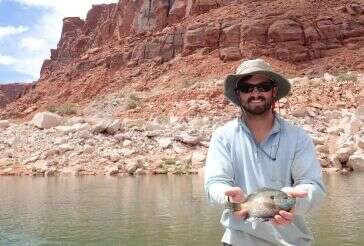
LSU is a long standing partner in philanthropy with the Brown Foundation. In 2023, as the Brown Foundation focused on agriculture and environmental issues, we ran a competitive program within the LSU that targeted career principal investigators. This would allow LSU the opportunity to work with their early career PIs to sharpen their grant writing and interviewing skillsets while presenting the Brown Foundation with novel ideas from numerous early career researchers. The Brown Foundation worked closely with the LSU College of Agriculture to solicit RFP responses from early career researchers. Out of the many candidates that were presented to the Brown Foundation by LSU, the Brown Foundation issued lead in awards ($15,000 each) to four candidates and then put them through another round of deep scrutiny to emerge with one first place finisher whose laboratory would be sponsored with an additional $100,000 funded in part in December 2023 and the remainder in July 2024. Prof. Garret Hopper was ultimately selected for his research program involving mussels. Mussels are powerful filter-feeders that remove particulate organic matter (POM) from river water, store nitrogen (N) and phosphorus (P) in their tissues as they grow and release labile energy and nutrients in excreta that fuel food webs. Developing strategies and aquaculture techniques that utilize these ecosystem services is a logical and sustainable option for agriculture production in Louisiana. Prof. Hooper’s proposal to the Brown Foundation was that culturing native freshwater mussel (family: Unionidae) biomass in nutrient polluted watersheds can help alleviate downstream impacts on coastal fisheries. Ecological stoichiometry (ES) is a framework to predict how animals regulate nutrient balances within their tissue and, consequently, how animal biomass affects nutrient cycling and storage. As a first step, LSU will leverage ES to quantify mussel-mediated nutrient fluxes (excreta and egesta) and storage (soft tissue and shell) relative to ambient river conditions where mussels naturally occur. Shells can be retained to age mussels (like tree rings), then used to calculate growth rates. A final model will estimate biomass production from growth and nutrient assimilation efficiency models to quantify nutrient removal by mussel populations. Prof Hopper’s proposal, integrating aquaculture, community ecology, and ES represents a sustainable future for LSU agriculture.
The Water Institute – within which the Brown Foundation proudly sponsors research and basic science - is an independent, non-profit, applied research institution advancing science and developing integrated methods to solve complex environmental challenges. Coastal regions are confronting complex, diverse, and interconnected challenges, including the impacts of sea-level rise, land loss, subsidence, environmental degradation, and increases in storm frequency and intensity. Communities, businesses, ecosystems, and essential infrastructure in these regions are facing substantial and growing hazards and risks. The Water Institute works to provide the best available science and decision making support to enable stakeholders to analyze, manage, and reduce risks. In December of 2023 the Brown Foundation – after a spirited competitive process that we conducted within the Water Institute searching for early career researches – issued a $100,000 research grant award to support the efforts of Eva Windhoffer, Coastal Wildlife Ecologist. Eva will be over seeing a Louisiana-specific pilot study that can inform future work on Louisiana water birds at a larger coast-wide scale. This project will use existing bird nesting and habitat data to identify spatiotemporal relationships between nest site suitability and evolving habitat characteristics. Existing aerial imagery data will be analyzed for bird use and habitat characteristics using remote sensing and machine deep-learning methods. The use of machine learning to support bird conservation is a rapidly evolving field and has yet to be applied to the Gulf coast. This work will be an innovative way to assess existing datasets and will help inform future bird conservation and barrier island restoration strategies. Further, a likely collaborative project with the Department of the Interior will be developing barrier island geophysical resilience metrics, information that can directly tie to bird habitat suitability. In addition, the Water Institute is creating a toolkit to inform future barrier island restoration and has been developing an Avian Guidance document that identifies several data gaps related to habitat characteristics and their influence on waterbird nesting. This project led by Eva and funded by the Brown Foundation can help to inform that toolkit and fill data gaps for Avian Guidance. -

The Joe W. & Dorothy Dorsett Brown Foundation has been proudly running an oncology research initiative since 2019. This highly competitive initiative has been by invitation only and has featured many of the top oncology research institutions in the United States such as MD Anderson, Sloan Kettering, Tulane, Salk, Duke, LSU and Dana Farber. In 2023 the Brown Foundation invited the Huntsman Cancer Institute to compete in this program and their reputation of being one of the elite research institutions in the world is certainly well founded. The specific oncology research initiative we ran with the Huntsman was a competitive program targeting early career researchers. After a substantial review period and interview process, our oncology grant review team proudly issued $255,000 in awards to the Huntsman – of which $151,000 was paid in December 2023 and $104,000 will be paid in July 2024 – to further the groundbreaking research efforts to help humanity defeat cancer. The Brown Foundation had hitherto never worked with the Huntsman and we would like to recognize the Huntsman for being truly superb to interact with and thank them for waiving all indirect costs associated with the research we are supporting and permitting us to undertake multiple rounds of live interviews.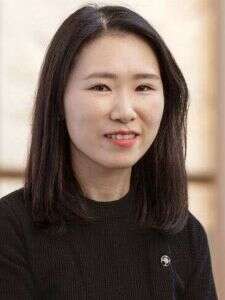
Two principal investigators received support for their laboratories at the Huntsman from the Foundation in 2023. In the laboratory of Nathan Krah, M.D., Ph.D. (pictured left), we are funding well-established mouse models of pulmonary fibrosis and myelofibrosis. Using Cre lines that are specific to fibroblasts, Dr. Krah will be able to genetically delete MCT4 from fibroblasts, and using fluorescent reporters, Dr. Krah will be able to track the phenotypes of these cells in disease models. The hypothesis is that genetic and pharmacologic inhibition of MCT4 will ameliorate fibrotic injury and lead to improved organ function in these models of disease. In the laboratory of Jihyun Song, Ph.D. (pictured right) – who received her first award as a principal investigator in her career through our program – she has identified several candidate genes through whole transcriptome analysis which can explain the increased thrombosis, inflammation, and clonal hematopoiesis observed in PV and ET. With support from the Brown Foundation, Dr. Song will be able to conduct further functional studies to determine the direct mechanisms by which these dysregulated genes affect inflammation and thrombosis. These studies will contribute to a deeper understanding of the complex molecular pathways involved in PV and ET pathogenesis and identify potential therapeutic targets. -
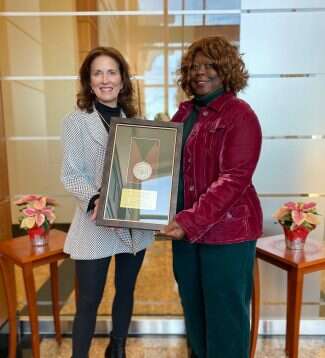
The Brown Foundation is deeply honored to announce that in December of 2023 Cheryl R. Austin received the Unmatched Dedication Award. Ms. Austin is the Executive Director of Greater Tremé Consortium and is a lifelong resident of the Tremé neighborhood. As director of Greater Tremé Consortium, Inc. (GTC), she has tirelessly fought for increased funding to alleviate the economic woes of the Tremé community. GTC was formed in 1993 with a mission to increase affordable housing opportunities for low-to-moderate income families and to support the development of small businesses in the Tremé neighborhood. Over the past twenty years, GTC has worked in all areas of community development to improve living conditions in Tremé, including housing, poverty, education, beautification, small business development, health, the environment, and preservation of Tremé’s unique culture. GTC’s involvement has included over 100 community meetings which led to the development of affordable housing (both rentals and home ownership), a community maintenance program, youth-run restaurant, a collaboration with the National American Civilian Corps, health testing, community gardens, housing and credit counseling services, and most recently, water management to prevent flooding.
In December of 2023, the Brown Foundation proudly issued the Incomparable Service Award to Rafael Goyeneche, III. Mr. Goyeneche has served as president of the New Orleans Metropolitan Crime Commission Inc. (MCC) for the past 30 years. The MCC was established on February 19, 1952, and has provided assistance on a continuing basis to the New Orleans-area community for over 70 years. The MCC mission is to identify, expose, and discourage corruption, fraud, ethical wrongdoing, and administrative violations at all levels of government within the Greater New Orleans region as well as other parts of Louisiana by reporting such activities to the appropriate authorities. The MCC Anti-Public Corruption (APC) program holds elected and appointed public employees, as well as government agencies, to the highest ethical standards. The MCC Research Program was established in 1996 with the mission of providing independent, objective research to raise the level of accountability and efficiency in the criminal justice systems in the greater New Orleans metropolitan area. Since its inception, the Research Program has broadened its scope to include projects examining the Jefferson, St. Tammany, and Calcasieu parish criminal justice systems. -
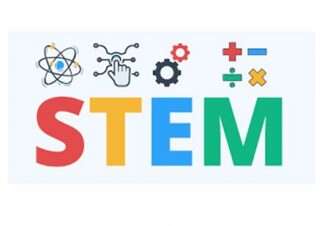
In August of 2023, the Brown Foundation issued an aggregate total of $347,447 in grants to 22 different organizations out of our SupportSTEM program. Since we launched this forward looking program in 2018, we have issued $1,535,982 in total awards out of our SupportSTEM program for STEM curriculum implementation or STEM instruction support for K-12 schools, non-profit groups, universities and technical colleges. In 2023, awards under this program ranged from as little as $1,090 to Ursuline Academy of New Orleans for their Haitian Engineer Sails Program to our maximum award amount of $20,000 that was issued to organizations such as YouthForce NOLA to support their 20 STEM externships in partnership with Junior Achievement. The Foundation is pleased to announce that we have renewed the SupportSTEM program again for 2024 and we are enthusiastically accepting applications for same. Please visit our education department section of this website for more information.
Emergency Response Program. The Joe W. & Dorothy Dorsett Brown Foundation maintains a cash reserve dedicated for programs that are responsive to natural disasters. Though the Louisiana coastline was spared from a major hurricane 2023, natural disasters still plagued our state in the form of forest fires predominantly in Beauregard Parish. These fires were brought on by a heat wave and drought not seen in south Louisiana in many years and over a thousand national guard troops were activated to deal with the outbreak of fires. In response to these fires in early August of 2023, the Foundation issued a $15,000 award to United by BBQ who were able to deliver BBQ chopped Beef, Pork Loin steaks and bread to make 1,400 on site meals for the first responders handling the fire. The fires of 2023 also resulted in the Foundation developing a research program for calendar year 2025 with Duke University on forestry fire mitigation matters. -

The Brown Foundation is deeply saddened by the passing of Justin R. Ehrenwerth in May of 2023. Justin, who officed part time in our Metairie based non-profit center during the pandemic and who conducted many meetings for the betterment of humanity from our conference room over the years, had a sophisticated, calm, and friendly demeaner with everyone in all situations and he was deeply respected by all who interacted with him. Justin’s love for the state of Louisiana poured through every action he took and he thoughtfully led The Water Institute through a period of tremendous growth of the institute’s impact. In January of this year - with Justin’s assistance – the Brown Foundation developed a highly competitive basic science program that is designed to give early career researchers at the Water-Institute the opportunity to receive over $200,000 in grant support to develop bedrock research data to utilize for larger future research initiatives. In April of 2023 - after a highly competitive process - we issued the first $50,000 to be divided among the following three Water Institute laboratories, overseen by early career PI’s: (a) Eva Windhoffer for her project titled: BARRIER ISLAND HABITAT ASSESSMENT FOR COASTAL WATERBIRDS, (b) Martijn Bregman for his project titled UNDERSTANDING AND PREDICTING NUISANCE FLOODING IN COASTAL LOUISIANA USING MACHINE LEARNING, and (c) Angshuman M. Saharia for his project titled QUALIFYING DAMAGES DUE TO PROJECTED FUTURE CLIAMTE CHANGES BY COMPOUD FLOODING FROM TROPICAL CYCLONES IN COASTAL LOUISIANA. Following the next phase of this competitive project and a series of interviews conducted by our program officers, the laboratory one of these three incredible early career scientists will receive an additional $200,000 paid out in phases according to the PI’s budget over the next twenty four months.
The Brown Foundation enthusiastically invited Southern University Agricultural Research and Extension Center to participate in one of our 2023 competitive basic science programs designed to promote early career principal investigators and help them develop bedrock data that may one day be utilized to secure a much larger award from NIH, NSF, DOD or other federal grant making bodies. Early career researchers are at a significant disadvantage to mid or late career researchers in securing grant support as they frequently lack the bedrock data necessary to compete effectively, regardless of how novel their ideas to further scientific knowledge may be. We at the Brown Foundation were deeply proud to issue the first $50,000 of what could be a total of $250,000 in grant support to further fundamental science at Southern University in Baton Rouge, Louisiana. The first phase of this competitive grant program focused exclusively on agriculture went from January through April of 2023 and our program officers selected the following three principal investigators to compete for the next $200,000 in grant support: (a) Dana Pollard, Ph.D. for her project titled THE COMPARATIVE USE OF FINE LIMESTONE, COARSE LIMESTONE, AND OYSTER SHELL AS SOURCES OF CALCIUM IN THE FREE CHOICE FEEDING OF LAYING HENS IN A SUBTROPICAL CLIMATE, (b) Harold Mellieon, Jr. Ph.D. for his project titled EFFECTS OF DRIED DISTILLERS GRAIN ON LAYING HEN DIETS TO INCREASE EGG PRODUCTION, and (c) Jodi Morton, Ph.D. for her project titled FERMENTED FEED: STORAGE LENGTH, NUTRIENT POTENTIAL, AND INCREASING GROWTH POTENTIAL IN PIGS. The Brown Foundation program officers look forward to the next phase of this competitive program and thank Southern University for developing the incredible selection of sophisticated up and coming principal investigators. -

Congratulations to the Brown Foundation Emma Noether Award Program 2023 Gold Medalist, Madison Echols. Madison will receive up to 75,000 dollars in scholarship support should she pursue post graduate studies in a qualified field. Madison was a 2023 senior at the Mississippi School for Mathematics and Science in Hattiesburg, MS and plans to attend Harvard University in the fall, studying Applied Mathematics with a Specialization in Biology and a secondary in Global Health and Health Policy. During her last two years of high school, she devoted her time to promoting awareness and accessibility in healthcare through research. In her senior year, she investigated the potential for Vitamin D3 to serve as a management measure in T2 Diabetes using Drosophila melanogaster as a model organism. Understanding the disparities in our society and the power of altruism, Madison is dedicated to giving back to her community, ensuring that quality education and quality living! are the standards for all regardless of race, background, location, or socioeconomic status. Madison is an International Science and Engineering Fair Finalist. At MSMS, she is President of Mu Alpha Theta Math Outreach, President of Interact Club, and volunteers weekly as a reading buddy for elementary students at her local public library. Beyond her passions for academics and community, Madison loves spending time with family and friends, reading, playing volleyball, and cooking.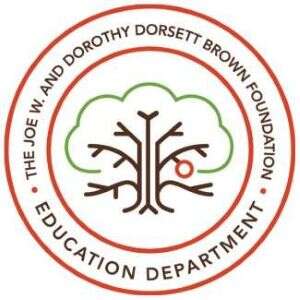
We developed our summer camp program in 2019 with the assistance of various K-12 educational specialists. Though COVID-19 made the first couple years of this program challenging for several reasons, 2023 marks the fourth successful year of our Summer Camp Program. We are so proud and appreciative of these groups that adapt to challanges faced by their planned programming and work tirelessly to still have impact on their campers. In March 2023, we approved $154,000 in funding for fifteen summer camp programs that offer camp to children with special needs, promote STEM, advance learning and leadership, prevent summer learning loss, incorporate academic enrichment activities and/or communicate with and engage parents and guardians before, during and after camp in the curriculum. To date, fifty-nine organizations have received Summer Camp support totaling $486,500! The Summer Camp Program will resume for a fifth consecutive year in 2024 with a larger budget available to award out to recipients. Please visit our Summer Camp webpage within the Education section of this site during the application period which opens in November 2023 and closes on January 31, 2024. With the exception of Camp Bon Coeur – our Summer Camp Program anchor - organizations that have received funds through this program for two years will be rotated out of consideration in 2024. -
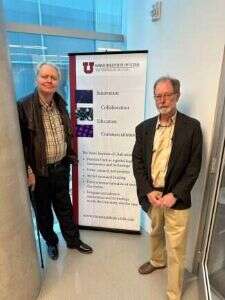
On March 6, 2023 our program officers were hosted by the University of Utah in Salt Lake City at the laboratory of Sentiomed, Inc. for an expenditure report and due diligence review on our research program and a tour of the lab facility. Our support for this research program results in greater knowledge and understanding for in vitro and in vivo development and testing of implanted sensor platforms and bio-gels. These smart sensors and bio trackers improve patient outcomes and our support is in tandem with grants from both NIH and NSF into Sentiomed. Sentiomed has demonstrated the need for inexpensive, quick and reliable COVID-19 (and other coronavirus variants) testing, and they have developed a platform that has potential applications beyond infectious disease diagnostics. Diabetes, for example, continues to be prevalent in our society and technological development of continuous sensors is critical to provide real-time information to an individual trying to timely counteract extreme spikes in glucose levels that damage the body. Biocompatibility, power requirements, and wireless info transmission are just a few of the challenges that Sentiomed is addressing in this exciting area of research that will alleviate human suffering. We thank Dr. Florian Solzbacher – who is the Director for University of Utah Center for Engineering Innovation and the co-Director of the Utah Nanotechnology Institute - for his tireless dedication and passion for bettering human lives through science and technology.
Featured above is the recipient of the Aspiring Researcher Scholarship Award presented by the Foundation in conjunction with the Tulane K12 program at the 2023 Greater New Orleans Science and Engineering Fair by our longtime collaborative partner Dr. Michele Sanchez. Congratulations to Valerie Yassel Erazo Rodriguez, a high school junior from Sci High (the New Orleans Charter Science and Mathematics High School) who won our award in the category of Behavioral and Social Sciences with her project titled Substance Abuse and Serotonin, Proposing a New Methodology to Analyze PET Brain Scan Images. Her research questioned how low serotonin levels increase the chances of becoming an addict. In order to explore questions about how different substances or mental disorders affect brain activity, she proposes a new systematic approach to analyze pet brain scans with freely available tools. Ms. Erazo receives a $2,500 undergraduate scholarship (funded by us but paid for through the Tulane K-12 program) which has been proudly awarded for four years now to a high school female that demonstrates passion and promise for scientific research. Students will receive their scholarship upon college or university acceptance. Congrats Ms. Erazo! -

Congratulations to the Brown Foundation Emmy Noether Award Program 2023 co Silver Medalist, Taylor Vander. Taylor will receive up to $25,000 in scholarship support should she pursue post graduate studies in a qualified field. Taylor was a 2023 graduating senior from Northshore High School, where she served in numerous leadership positions, including Founder and President of a Habitat for Humanity Chapter on her school campus. She is passionate about using data to find practical solutions to real world problems, such as housing affordability. She plans to pursue a Bachelors degree in Computer Science and Ph.D. in Data Science. Through hands on experience in the Science and Engineering Apprentice Program (SEAP) with the Naval Research Laboratory at Stennis Space Center, Taylor was able to use data mining to create a global prediction of seafloor day minerals and common day mineral species (kaolinite, illite, smectite, chlorite) to present a scientific poster at the American Geophysical Union Fall Meeting. As a Student Volunteer with the Naval Research Laboratory, Taylor prepared a scientific paper for publication which detailed her summer research utilizing data analysis techniques to create housing scenarios, guide decisions in real estate development, and influence public policies on housing affordability with the intent of alleviating the global housing affordability crisis. Taylor will be attending either Wake Forest University, University of Alabama, or Howard University in the fall.
Congratulations to the Brown Foundation Emma Noether Award Program 2023 co Silver Medalist, Amy Liu. Amy will receive up to 25,000 in scholarship support should she pursue post graduate studies in a qualified field. Amy was a 2023 graduating senior at Benjamin Franklin High School in New Orleans, Louisiana, and will be attending Duke University to pursue a double major in Statistics and Psychology. She has conducted research in the psychiatry department at the LSU Health Sciences Center studying the mental health impacts of COVID19 discrimination upon Asian American medical students, where she won First Place in Study and Presentation for her work. Additionally, Amy has worked in machine learning research through the Beaver Works Summer Institute at the MIT Lincoln Laboratory. She is the founder of her schools Mental Health Advocacy Club and the literary journal, and is heavily involved with Science Olympiad, the physics tutoring program, and Speech and Debate. Outside of school, you can find her volunteering with the Southeast Louisiana Youth Council, playing piano, writing poetry, or reading a new book from her to be read list. -
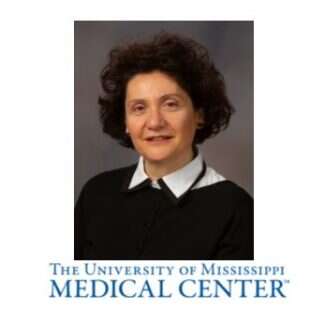
The University of Mississippi Medical Center is well known to the Brown Foundation and was a returning competitor to our 2022 basic science program in Neuroscience. After a spirited competition that spanned multiple rounds of analysis and several interviews, the first place winner from the University of Mississippi in the Joe W. & Dorothy Dorsett Brown Foundation’s 2022 Neuroscience Program was the Sleep and Memory Dysfunction Laboratory of Dr. Barbara Gisabella. In December of 2022, the University of Mississippi received the first tranche of this multi-year award to further the hard work of Dr. Gisabella. Sleep and memory dysfunction are key features across many psychiatric disorders, strongly associated with worsening symptoms and impacting quality of life. For example, a majority of patients with schizophrenia display both decreased sleep spindles and memory consolidation deficits. In comparison, people suffering from post- traumatic stress disorder (PTSD) have sleep disruption and nightmares, associated with heightened strength of fear memories. A growing number of studies support the theory that infrequently used dendritic spines are pruned during sleep, thus improving memories by enhancing the signal to noise ratio of frequently reinforced synaptic connections. Dr. Gisabella will utilize her laboratory’s award from the Brown Foundation to undertake two planned studies that will develop the foundation for further studies designed to identify how these processes are altered in PTSD, schizophrenia, mood disorders and aging, with the long term goal of leveraging this system for developing therapeutic treatments to target memory dysfunction. The Brown Foundation’s 2022 Neuroscience Program was specifically designed to help launch early career individuals with exciting new ideas to develop bedrock data to utilize for larger projects, we believe Dr. Gisabella’s and her innovative work will one day be well respected throughout the country and are honored to play this small role in helping her set up and grow her laboratory.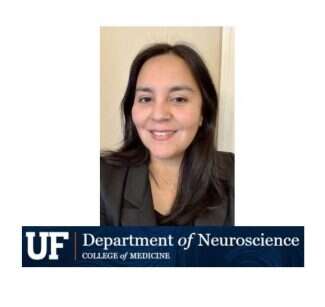
2022 marked the second time over the past five years that the University of Florida competed in one of the Brown Foundation’s fundamental research programs, and we were delighted to have UF back as one of our partners in the alleviation of suffering. After a competitive process including site visits, interviews, and other competitive processes, the laboratory of Karina Alviña, PhD received the first half of the first place award in December 2022. Dr. Alviña investigates how mechanisms underlying learning and memory are altered by environmental factors such as stress, dietary habits and exercise. She is also interested in uncovering how these mechanisms relate to age-associated cognitive decline and neurodegenerative disorders such as Alzheimer’s disease. It was recently revealed that the exercise-derived myokine (i.e. protein derived from the skeletal muscle) called Irisin can act as neuroprotective endogenous agent. Irisin generally contributes to regulating metabolism and thermogenesis; however, Irisin is also released after exercise, which is known to have positive effects on cognitive function (i.e. learning and memory) and overall health. In addition, Dr. Alviña’s group discovered that Irisin can potently counteract the deleterious effects of stress on learning and memory. Specifically, when her laboratory injected Irisin in the hippocampus of mice and exposed the mice to stress, they observed that Irisin injection prevented the memory deficit induced by stress. Importantly, these results were observed in males only. Building on these findings, Dr. Alviña’s laboratory will utilize the Brown Foundation’s financial support to continue to investigate the effects of Irisin on hippocampal function as a stress resilience molecule, including both male and female mice. They will use a combination of electrophysiological measurements in brain slices and behavioral analysis of memory function. Furthermore, they will also use an Alzheimer’s disease mouse model to test Irisin and exercise paradigms as anti-neurodegeneration agents that could help preserve learning capabilities in older individuals. -

The University of Alabama at Birmingham (UAB) is a public research university in Birmingham, Alabama. Developed from an academic extension center established in 1936, the institution became a four-year campus in 1966 and a fully autonomous university in the University of Alabama System in 1969. Prior to 2022, the Brown Foundation had never undertaken a research program in partnership with UAB. That said, while our program officers were developing the list of which world class institutions of higher learning would be competing in our 2022 Neuroscience Program, we quickly became of aware that the UAB Department of Neurobiology is making a national and international impact in fundamental neuroscience research so we of course invited them to submit numerous candidates for us to assess for this highly competitive program. In December of 2022, we announced the first place winner and recipient of $140,000 in aggregate grant support from us to be the laboratory of Kirstie A. Cummings, Ph.D. for her project titled: Neural Substrates of Fear Memory Expression and Suppression. How do we know to be afraid if we come face to face with a tiger, but not with a pet cat? Why is it so hard to get back in a car and drive shortly after being involved in a fender bender? Research in the Cummings laboratory seeks to identify the neural substrates of learning and memory, and uses fear as a model to investigate the circuits involved in the expression and suppression of memory. We are also interested in how this normal learning and memory circuitry might go awry in anxiety disorders such as post-traumatic stress disorder (PTSD), where fear memory is pathologically high and the ability to suppress it is greatly reduced. The Cummings lab uses a multidisciplinary combination of cutting-edge approaches in rodent models to define the exact cells and neural circuits responsible for fear memory encoding and suppression. Her lab’s aim is to advance humanity’s fundamental understanding of these learning and memory processes to pave the way towards a more comprehensive view of the dysfunction of these circuits in disorders of learning and memory like PTSD. Ultimately, Dr. Cummings’ goal is to use this new information to aid in the development of more effective therapeutics for PTSD and other types of learned anxiety disorders.
Joe W. Brown personally credited Dr. Jonas E. Salk with saving humanity with his polio vaccine. We at the Brown Foundation have been staunch supports of the Salk Institute for Biological Studies for decades and we are proud that the Salk has competed in our various fundamental research program for three out of the last four consecutive years. In December of 2022, the Brown Foundation was proud to announce that the first place winner out of our highly competitive 2022 Neuroscience Program from the Salk was the Molecular Neurobiology Laboratory of Sreekanth Chalasani, PhD for its project – “Watching a brain learn and remember in real time”. Animals learn and remember relevant information, but the underlying mechanisms remain elusive. Dr. Chalasani hypothesizes that conserved signaling pathways and neural circuit computations drive learning and memory across species. During the rigorous interview process undertaken by the Brown Foundation at the Salk, Dr. Chalasani said that “(w)e will discover these using the nematode C. elegans, which learn the size of a bacterial lawn and remember it for at least 60 minutes. We built a microscope that monitors both whole brain activity and behavior in freely-moving animals. We will first identify what this animal learns from exploring precise bacteria patches; then monitor its whole brain activity changes during learning and recall; and finally probe the underlying molecular changes.” The Brown Foundation is enthusiastic to assist this up and coming researcher at the Salk and we are enthusiastic to watch the matriculation of his career. -

In December of 2022, the Joe W. and Dorothy Dorsett Brown Foundation’s Shelter and Food Security Program awards were issued to approved applicants. The 30 organizations participating in the program in 2022 will receive an aggregate total of $715,000.00 in grant support for their respective efforts to address homelessness, offer support and rehabilitative services to individuals suffering a translational homeless crisis, and provide widespread access to food in the parishes of Jefferson, Orleans, Lafourche, St. John, Acadia, Calcasieu, Lafayette, St. Landry and St. Charles. The Shelter and Food Security Program will return in 2023 for its third full season with the Joe W. and Dorothy Dorsett Brown Foundation. The application window is currently open and closes on August 31, 2023, though Letters of Interest to determine whether an organization will be invited to participate are due to us by March 31, 2023. Organizations, other than food pantries, may qualify for support from this program for two consecutive years. Food pantries may qualify for support for one year from this program.
The Joe W. and Dorothy Dorsett Brown Foundation Service Learning Event was back-on in 2022, after a two year COVID-19 caused hiatus! On September 13, 2022, the Brown Foundation hosted both public and private schools, non profit agencies and SE Louisiana community leaders to kick-off the 2022-2023 Service Learning Program. The celebration was held at the Lake Pontchartrain Center in Kenner, Louisiana, a location that has hosted this event for the Foundation for nearly two decades. Non-profit agency exhibitors met with students, teachers, and other educators. During the opening ceremony, we introduced many of our traditional philanthropic partners in Service Learning to collaborators at the STEM Library Lab and it’s employee Maria Landrum who will be administering service learning in association with the Foundation moving forward. -

The Foundation is proud to announce that the laboratory of Dr. Georgios Kogias – of Louisiana State University - is one of our first place winners out of our 2022 Neuroscience Program. Dr. Georgios Kogias received his PhD in 2019 and is currently a third-year postdoctoral fellow. He has been working on the molecular mechanism of learning and memory formation. We at the Foundation recognize that a deficit in memory consolidation, a process that transforms short-term to long-term memory, can lead to memory impairment. This can occur in aging, in many neurological disorders, or following a traumatic event such as in PTSD. Once formed, memory can be modified. Following reactivation of the learned memory, the original memory becomes transiently labile and undergoes re-stabilization. This provides a window of opportunity that can strengthen or weaken the memory. Dr. Kogias aims to identify pharmacological targets that selectively enhance or disrupt these memory formation and modification processes and the Joe W. & Dorothy Dorsett Brown Foundation is pleased to say that we issued the first half of Dr. Kogias’ first place prize of $125,000 in December of 2022. The LSU pilot study has already shown that a transcriptional factor, PPARα, increased the activity of an endocannabinoid degrading enzyme, MAGL, and thereby reduced endocannabinoid signaling. Importantly administration of a PPARα antagonist disrupted both original and reconsolidated memories. The goals for this continuation of this program study that the Foundation’s grant award shall support are 1) to determine whether administration of a PPARα agonist reduces endocannabinoid signaling and enhances memory, and 2) to identify endogenous agonists of PPARα that are elevated by learning and memory reactivation. Successful completion of these experiments will lay the foundation for future studies of the mechanisms that control PPARα activation during learning and memory. The advantage of a reconsolidation intervention is that it involves just a single administration of a memory-modulating drug during a specific time window to enhance or reduce the memory. The study will allow LSU to expand models of fear memory formation to include the cerebellum beyond a traditional amygdala- and hippocampal-focused investigation. This study may reveal novel treatment strategies for PTSD and new therapeutic targets to treat memory impairment.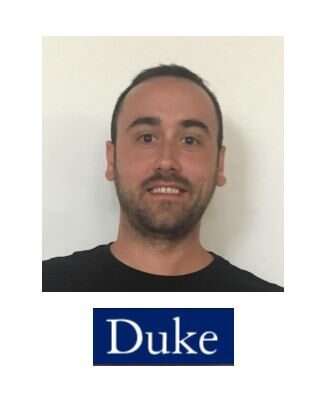
This is the third time that Duke University has participated in the Joe W. & Dorothy Dorsett Brown Foundation’s competitive annual fundamental research program. Fundamental research submissions from Duke University always excel in every way and determining a first place winner from among their elite research laboratories is a significant undertaking. In December of 2022, the Brown Foundation was proud to announce that our first place winner from Duke University is the laboratory of Fernando Cruz Alsina, PhD – Senior Postdoctoral Researcher – Silver Lab/Duke Molecular Genetics and Microbiology. Dr. Alsina arrived at Duke University after receiving his PhD in Biological Sciences at the University of Buenos Aires (UBA), Argentina. The goals of the research that the Brown Foundation is supporting with an aggregate total of $140,000 in grant monies focuses on the role of RNA binding proteins and RNA regulation during brain development, and a central RNA regulator, the Exon Junction Complex (EJC). Dr. Alsina has thus far already discovered that the nucleating component of this complex, EIF4A3, is required for axonal tract formation while the other canonical binding partners, unexpectedly, are not. He further has excited found that EIF4A3 non-canonically promotes axonal growth by EJC-independent regulation of microtubule dynamics in neuronal projections and further determined that EIF4A3 is a novel microtubule binding protein, necessary and sufficient to promote microtubule polymerization. An emerging topic from his research is the concept of dual RNA and microtubule regulation which has been barely investigated. Further, its significance in neuronal connectivity and plasticity is yet to be determined, despite abundant expression of both RNA-binding proteins and Microtubule-associated proteins in neurons. Dr. Alsina’s research proposal for the Brown Foundation combines his areas of expertise to address this important topic with implications for understanding neuronal plasticity and human disease, creating opportunities to further extend the investigation of these topics in human models in the future. The support of the Brown Foundation will ideally be a steppingstone to generate solid data (which we at the Brown Foundation call “bedrock data”) for future grant applications and job applications, and it will pave the way for establishing the independent research program of Dr. Alsina’s laboratory. -
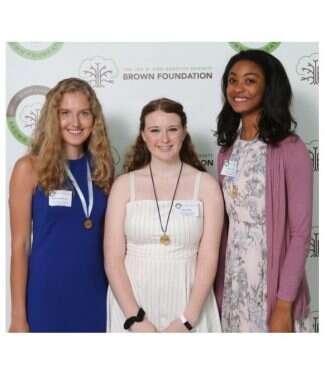
Our 2022 Emmy Noether Awards Ceremony was held in Orleans Parish on Saturday, June 4, 2022 at the Louisiana Cancer Research Center. This year, we were especially pleased to announce that in July of 2022 we sent our first round of fellowship checks out to our three initial Emmy Noether Awards Program gold medalists from 2017, 2018, and 2019! Pictured above from the 2019 ENA Event, from left to right. Congratulations to our 2017 gold medalist Hailey Rowbatham who received her first award check of $12,500 as she launches her graduate school career at University of California, Berkley for a masters in Environmental Engineering. Congratulations to our 2018 gold medalist Grayce Mores who received her first award check of $12,500 as she launches her graduate school career at Northwestern University Driskill Graduate Training Program in Life Sciences. Grayce is committed to a Ph.D. in Microbiology. Congratulations to our 2019 gold medalist Amaris Lewis who received her first award check of $12,500 as she launches her graduate school career at Stanford University masters degree program for Biology. Watching these young women matriculate through undergraduate school in furtherance of their respective dreams and getting to play this small part as they continue their education has been an incredible honor for the Brown Foundation.
2022 Emmy Noether Awards – Gold Medalist, Ashini Modi is a recent graduate of Caddo Parish Magnet High School in Shreveport, Louisiana with plans to attend Harvard University to study Physics or Astrophysics. She is a passionate researcher and amateur astronomer who has completed projects on topics ranging from Gravitational Waves to exoplanet atmospheres. She competed at the Regeneron International Science & Engineering Fair where she placed third in Physics and Astronomy. She most recently took home first place in physical sciences at the National Junior Science and Humanities Symposium and co-authored a publication on the Two-Dimensional Correlation Function of Binary Black Hole Coalescences. As a firm believer that education is a right and not a privilege, she is dedicated to reading books and STEM mentorship to unhoused and underrepresented students in her community through charitable organizations Reading Rainforests and Students to Scientists. When not conducting research or volunteering, Ashini enjoys playing the violin, advocating for environmental sustainability, hiking, and baking vegan goodies with her sister. -

2022 Emmy Noether Awards – Silver Medalist, Yewon Lee graduated as valedictorian of James Clemens High School in Madison, Alabama. Interested in chemistry and its myriad of applications to human health, Yewon worked on a metabolomics study to model nuclear magnetic resonance spectra, establishing metabolic signatures of type I diabetes. She has received awards at the International Science & Engineering Fair and is an alumna of the Research Science Institute. In her community, Yewon is an advocate for mental health and pediatric cancer awareness and mentors students each summer, developing a curriculum in mathematical problem-solving. Outside of research, Yewon enjoys writing about current events, dabbling in nature photography, and mountain biking. Yewon will be attending Harvard University and majoring in Chemistry. The Emmy Noether Awards seek top aspiring female research scientists in any STEM (science, technology, engineering, or math) field to help realize their potential careers through financial and networking assistance. These two silver medalists will be awarded $25,000 each for a qualified graduate level program. As Emmy Noether Scholars, they will join a network of young female aspiring research scientists and will be offered information on internship and networking opportunities.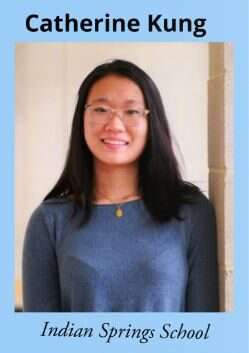
2022 Emmy Noether Awards – Silver Medalist, Catherine Kung. At Indian Springs School, where LEARNING THROUGH LIVING is the motto, Catherine has indulged her love of math and science in numerous electives and activities and has had the opportunity to explore her passion of studying the intersection of biology and technology. She is inspired by the innovation of technology to address human needs and health problems. Throughout high school, she was devoted to research on developing a bio inspired artificial skin to ultimately engineer a method of mimicking the brains sensory interpretation, and she received the best student paper award at an international SPIE conference for this work. More recently, at the University of Alabama, she worked on the recognition of American Sign Language using radar and machine learning. As a longtime volunteer at the Alabama Wildlife Center, she also advocates the protection of animals and the reduction of unnecessary use of animals in scientific experiments. At school, she is the chair of the Science Olympiad team, Math Club, and Psychology Club. Beyond Catherines scientific commitments and explorations, she has played violin for eleven years and has been actively involved in orchestra, chamber, and the music program at Indian Springs. Currently, she plans to attend MIT and pursue her interests in biological engineering and cognitive sciences. -

The Foundation is honored to have the University of Alabama at Birmingham competing in our 2022 Neuroscience Program. In May of 2022, the Foundation issued $45,000 via three lead in awards for this program to UAB to further the work of the principal investitors while they are competing in our program for the grand prize of an $125,000 that will be issued to the University of Alabama at Birmingham in December of 2022. The competing principal investigators and their respective programs are: (1) Dr. Summer Thyme - Studies will define the location and abnormal function of brain cells participating in learning and memory activities, and will also set the stage for developing drugs to modulate these mechanisms. (2) Dr. Krisite A. Cummings - To identify the neural substrates of learning and memory, and uses fear as a model to investigate the circuits involved in expression and suppression of memory. (3) Constanza Cortes Rodriguez - To develop exercise-mimicking therapeutic compounds to promote similar brain benefits in human populations that are at risk for the development memory decline.
The Foundation is honored to have LSU Health New Orleans competing in our 2022 Neuroscience Program. In May of 2022, the Foundation issued $45,000 via three lead in awards for this program to LSU to further the work of the principal investitors while they are competing in our program for the grand prize of an $125,000 that will be issued to LSU in December of 2022. The competing principal investigators and their respective programs are: (1) Xiaolin Tian, Ph.D. - Focus on the mechanisms that couple the cellular properties and the neuronal functions of dopaminergic neurons and how targeting may help treat conditions that affect learning and memory as well as other key brain functions that require dopaminergic inputs. (2) Xiao Ching Li, Ph.D. - Experiments will bring novel insights into vocal learning and development on the genetic, circuit and behavioral levels, enhancing our understanding of human language development and related disorders. (3) Georgios Kogias, Ph.D. - To identify pharmacological targets that selectively enhance or disrupt memory formation and modification processes. -

The Foundation is honored to have Duke University Medical Center competing in our 2022 Neuroscience Program. In May of 2022, the Foundation issued $45,000 via three lead in awards for this program to Duke to further the work of the principal investitors while they are competing in our program for the grand prize of an $125,000 that will be issued to Duke in December of 2022. The competing principal investigators and their respective programs are: (1) Khadar Abdi, Ph.D. - To further explore mechanistic links between CNS BCAA metabolism and learning memory. (2) Fernando Cruz Alsina, Ph.D. - To focus on the RNA-binding Exon Junction Complex. The EJC widely associates with the transcriptome and acts as an indispensable guardian of mRNA fate throughout it life cycle. (3) Francesco Poalo Ulloa Severino, Ph.D. - To determine the astrocytic changes in gene expression and translational levels upon learning-dependent structural changes.
The Foundation is honored to also have the University of Mississippi Medical Center competing in our 2022 Neuroscience Program. In May of 2022, the Foundation issued $45,000 via three lead in awards for this program to UMCC to further the work of the principal investitors while they are competing in our program for the grand prize of an $125,000 that will be issued to the University of Mississippi in December of 2022. The competing principal investigators and their respective programs are: Dr. Daniela Rueedi-Bettschen - To identify factors impacting METH-induced learning and memory impairments and further the knowledge of a possible molecular origin of the impairment. Dr. Shashank Shekhar - To advance science as the critical and rigorous prelude to the subsequent step of testing mechanism underlying memory and cognitive impairment. Dr. Barbara Gisabella - To develop the foundation for further studies designed to identify how sleep and memory dysfunction processes are altered in PTSD, schizophrenia, mood disorders and aging, with the long term goal of levering this system for developing treatments for memory dysfunction. -

In August of 2022, the Brown Foundation’s Education Department will proudly award 14 recipients a total of $213,454 in SupportSTEM program awards. This program serves STEM curriculum implementation or STEM instruction support for K-12 schools. At five years since inception, our SupportSTEM Program has issued an aggregate total of $1,188,535 to 89 K-12 schools, non-profit groups, universities and technical colleges. All budgetary items must directly impact STEM education in K-12 schools. Budgetary examples include but are not limited to: paid professional development, curriculum models, STEM kits, STEM conferences, transportation, consumable materials, equipment, and on-going STEM programs that enrich curriculum.The Foundation is pleased to announce that we have enthusiastically renewed this program again for 2023. Please visit the Education Department section of this website for more information and be prepared to turn your applications in on or before March 15, 2023.
2022 marks a third successful year for our Summer Camp Program. This program had been one of the tougher programs the Brown Foundation has ever launched due to the disruptions caused by COVID-19 that have impacted the program every year. The program’s intent remains to (a) serve children unable to attend most other camps due to special medical needs, or (b) serve those camps focused on promoting STEM and advanced learning. Thirteen camps were awarded an aggregate total of $110,000 in 2022, bringing our total Summer Camp awards to $332,500 for 43 camps since the program began in 2020. Please visit the Education section of our website for more information on applying. We are pleased to announce that the Summer Camp program has been renewed for 2023. The application packet for 2023 will be posted to the Education section of our website by December 1, 2022 and the deadline to apply for support in 2023 will be January 31, 2023. -
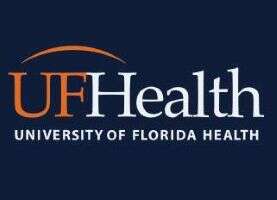
The Foundation is honored to also have the University of Florida College of Medicine competing in our 2022 Neuroscience Program. In May of 2022, the Foundation issued $45,000 via three lead in awards for this program to UF to further the work of the principal investitors while they are competing in our program for the grand prize of an $125,000 that will be issued to the University of Florida in December of 2022. The competing principal investigators and their respective programs are: (1) Karina Alvina, Ph.D - To investigate how mechanisms underlying learning and memory are altered by environmental factors such as stress, dietary habits and exercise. (2) Mark Moehle, Ph.D - To understand the cellular, molecular and circuitry changes that underlie systems of neurological disorders. (3) Nancy Padilla-Coreano, Ph.D - Uncovering the neural mechanisms of social memory and furthermore, using machine and circuit-specific manipulations, they will identify neural dynamics underlying social memory.
The Foundation is honored to also have the Salk Institute for Biological Studies competing in our 2022 Neuroscience Program. In May of 2022, the Foundation issued $45,000 via three lead in awards for this program to Salk to further the work of the principal investitors while they are competing in our program for the grand prize of an $125,000 that will be issued to the Salk Institute for Biological Studies in December of 2022. The competing principal investigators and their respective programs are: (1) Nicola Allen, Ph.D. - Investigate if changes in astrocytes is responsible for inhibiting synaptic plasticity in adulthood, by asking if blocking or reversing these changes is sufficient to enhance plasticity and learning in the adult brain. (2) Eiman Azim, Ph.D. - To leverage state-of-the-art molecular-genetic, behavioral, electrophysiological and computational principles of how to motor system learns. (3) Sreekanth Chalasani, Ph. D. - Discover using the nematode C. Elegans, will build a microscope that monitors both whole brain activity changes during learning and recall; and finally probe the underlying molecular changes. -
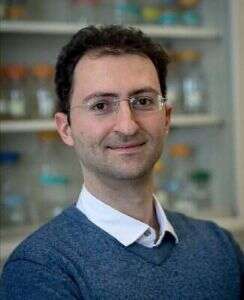
Georgios Karras, PhD - Assistant Professor, Department of Genetics, Division of Basic Sciences - Project: Anti-Aging – HSP-90 Project - It has long been proposed that the severity of age-related diseases is modified by chronic environmental exposures by exerting stress to the molecular machines operating within our cells, yet very few such exposures have been identified. To address this issue, we focused on a major sensor of environmental change, the protein-folding chaperone heat shock protein 90 (90). Previous research from my lab established that Hsp90 can “buffer” (that is – mitigate) the biological effects of mutations linked to diverse Mendelian diseases, including the age-related disease Fanconi Anemia, and in doing so can couple disease to seemingly benign environmental cues, such as fever. Employing new functional assays and cutting-edge high-throughput methodologies we are identifying chemicals that are able to reverse or delay the age-induced impairment of Hsp90 function.
Memorial Sloan Kettering Cancer Center is one of the top medical research institutions in the world, and we at the Brown Foundation were deeply honored to have this organization competing in our 2021 Healthy Ageing Program. There are approximately 1,700 elite medical residents and Fellows that are in training at MSK and an additional 575 postdoctoral researchers training at MSK labs and a combined 288 PhD and MD-PhD candidates. We at the Brown Foundation knew the competition from MSK was going to be impressive and we are so pleased to announce that After a competitive competition, the winning laboratory that received their $100,000 grant in December of 2021 was Molecular Pharmacology Program under the supervision of Merav Antman-Passig, PhD. Merav is working on a novel way of detecting Alzheimer’s biomarkers in vivo with near-infrared optical nanosensors. A major barrier in the development of successful preventative treatments for Alzheimer’s disease (AD) is the lack of diagnostic measures that can detect AD at early stages and longitudinally monitor disease progression. Accumulation of self-assembled amyloid-beta protein is a central and early event in the development of AD, however, detecting AD at early stages remains an ongoing challenge with current techniques. Merav is therefore developing an optical nanosensor that detects amyloid-beta biomarkers in-vivo for early detection, and long-term assessment of AD progression. -
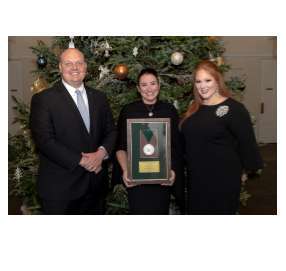
The Foundation is deeply honored to announce the winner of our inaugural Calm After the Storm Excellence Award issued on November 30, 2021 was Kim Boudreaux, Executive Director of Catholic Charities of Acadiana in Lafayette, Louisiana. Catholic Charities of Acadiana is now the official disaster response agency for the Diocese of Lafayette. Care for the sacred gift of all human life, especially the most vulnerable. These values define this organizations culture and guide their hard work. By embodying these virtues Catholic Charities continues to be aligned with Catholic Social Justice Teachings and capture the unique spirit in which they operate. As Executive Director, Ms. Boudreaux heads up the Acadiana Voluntary Organizations Active in Disaster - AVOAD - and fosters efficient, streamlined service delivery to people affected by disaster, while eliminating unnecessary duplication of effort through cooperation, communication, coordination and collaboration in the four phases of disaster - preparation, response, recovery, and mitigation. Pictured is Ms. Boudreaux being presented with the award by Brown Foundation representative Becky Hunter and her husband, Lake Charles mayor, Nic Hunter.
Aging is the biggest risk factor for most human diseases. Individuals age at different rates, and even specific cells and tissues within a person age differently. This depends on intrinsic properties, including genetics and where cells are in the body, and extrinsic factors, like exposure to environmental toxins and pathogens. The Brown Foundation of course worked with the Salk Institute for Biological Studies in our 2021 Healthy Ageing Program, and the Molecular and Cell Biology Lab of Martin W. Hetzer, PhD received our top prize of $100,000 in December of 2021. Dr. Hetzer is trying to understand the role of the vascular system in healthy aging. Cerebrovascular pathologies (e.g., microinfarcts, hemorrhage, atherosclerosis) have been associated with cognitive impairment and dementia during normal and pathological aging. The Salk has recently found that vascular endothelial cells (VECs) that form blood vessels of the brain, referred to as blood brain barrier (BBB), are extremely long-lived. Dr. Hetzer’s approach will recapitulate key features of human vascular degeneration during physiological aging and AD, and will identify novel biomarkers that can be exploited to develop future therapeutics modulating the vascular function. -

Scripps Research advances scientific understanding, educates the scientists of tomorrow and impacts human health across the globe. Scripps research is science changing life and we at the Brown Foundation were so pleased this prestigious organization that competed in our 2019 Oncology Program was again competing in one of our basic science programs – this time our 2021 Healthy Ageing Program. After a competitive selection process and numerous interviews, the Foundation selected Mia Huang, PhD - Assistant Professor, Molecular Medicine – as our first place winner and principal investigator overseeing how the $100,000 grant award we issued to Scripps Research in December 2021 would impact the world. For every individual during the natural progression of ageing, cells of the musculoskeletal system deteriorate, manifesting as pain or loss of mobility. Muscle satellite stem cells reside in mature muscle and have the capacity to repair decaying muscle tissue; however, they normally remain quiescent and are not activated during the ageing process. Understanding the molecular regulators that govern quiescence and activation could lead to strategies to mobilize these muscle stem cells during ageing. However, many of these molecular regulators remain obscure, hindering the potential of muscle stem cells for regenerative medicine. The Huang Lab seeks to decode the molecular messages used by muscle satellite stem cells that influence quiescence and activation. Armed with the latest technological advances to characterize glycans and study their function, Dr. Huang aims to determine the language of glycans in muscle stem cells, thereby unlocking the potential for therapeutic intervention. The translation of these basic research discoveries in muscle cell biology could help preserve lean muscle mass, strength and mobility with age, ultimately transforming the quality of later life whilst also taking the burden of elderly care off families and medical providers.
With a focus on personalized medicine, National Jewish Health (NJH) researchers are looking at environment-gene interaction and making strides in predicting, preventing, treating and tracking many diseases. Known for translating the lessons of basic science and applying them to human diseases, NJH attracts world-class researchers who conduct leading-edge scientific investigations. 2021 marked the first year NJH competing in one of the Brown Foundation’s basic science programs and we were so pleased to issue a first place award of $100,000 in December of 2021 under the supervision of Russell Bowler, MD, PhD as principal investigator for his project: The Influence of Aging and Environment on Changes in the Human Metabolome. During the competition we learned that the human metabolome consists of thousands of small molecules .. amino acids, carbohydrates, hormones, lipids, etc .. that reflect the overall health of the individual. While it has previously been shown that age has important effects on the metabolome, there are no longterm studies of exactly how an individuals metabolome changes with age, particularly in older individuals who are healthy from a clinical perspective and who have had CT scans and lung function studies. Therefore, while human lung function dramatically declines with aging, little is known about whether and how the metabolome can be used to assess aging-related diseases, including rapid aging-associated loss of lung function. The study Brown Foundation is funding will examine changes in the metabolome in each of 7,000 healthy individuals, who range in age from 55 to 90. Some are smokers and some have never smoked, and all have been phenotyped for key aging-related diseases, such as COPD, osteoporosis and coronary disease. -

LSU’s Pennington Biomedical Research Center in Baton Rouge puts science to work for a healthier Louisiana, so they were a natural organization for us to invite to compete in the Brown Foundation’s 2021 Healthy Aging Program. A world research leader right here in Louisiana, the Pennington’s mission is to discover the triggers of chronic diseases through innovative research that improves human health across the lifespan. Congratulations to Candida Rebello, PhD, RD for her selection as the first place winner out of Pennington following the competition. We are certain the $100,000 under her direction as principal investigator shall be well utilized. The first aim of Dr. Rebello’s work is to identify in hASC, the peak time of PPARγ protein expression, whether PPARγ is phosphorylated at serine 273, and the components of the PPARγ regulatory complex, following NRBC treatment. The second aim is to elucidate the mechanisms by which NRBC acts in the brain to regulate food intake and body weight in mice using electrophysiologic approaches. Advances in our understanding of the transformation of adipocytes from fat storage to fat burning cells that modulate whole-body insulin sensitivity are limited by the absence of safe mediators of these effects in humans. This research will facilitate an understanding of the brain and peripheral mechanisms that safely activate an anti-obesity and anti-diabetes program to promote healthy aging.
Vanderbilt prides itself on being a preeminent global research university whose faculty are recognized for path-breaking research and innovative leadership in higher education, the Brown Foundation was honored to have such an institution competing in our 2021 Healthy Aging Program. Congratulations to James Dewar, PhD and his entire team for winning the Foundation’s first place award in healthy aging for the contest at Vanderbilt University. In September of 2021, the Brown Foundation issued a $100,000 first place research award to Vanderbilt with James Dewar, PhD as the principal investigator to apply toward the development of a biochemical system to study cellular aging. Telomeres are molecular structures that ordinarily protect chromosome ends but this activity is compromised by repeated cell divisions, resulting in cellular aging. We are currently limited in our ability to study telomere defects or target telomeres with therapeutics because cellular approaches to study this process are laborious and time consuming. To address this limitation, Dr. Dewar will develop a revolutionary biochemical system that will allow for rapid and detailed interrogation of telomeres and support high-throughput screens for small molecules that can modulate telomere function. -

For more than two decades the Brown Foundation has proudly supported various research programs at MD Anderson Cancer Center. While conducting numerous interviews of prospective principal investigators for our 2021 Healthy Aging Program at MD Anderson, the Foundation learned of the potentially revolutionary work of New Orleans native Joya Chandra, PhD in the Department of Pediatrics at MD Anderson. In September of 2021, the Foundation issued a $100,000 grant out of our Oncology Program to MD Anderson in support of Dr. Chandra’s efforts in designing interventions to promote healthy cardiometabolic aging in pediatric cancer survivors. Dr. Chandra proposes to use a transgenic mouse model which can track and eliminate senescent cells to pinpoint a role for anthracycline induced senescence as a contributor to cardiac damage, and to test timing and efficacy of energy balance interventions. Data generated from this study will inform clinical trials for pediatric cancer patients which we hope will prevent premature cardiometabolic aging.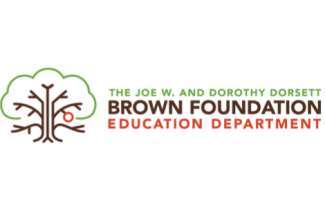
In September of 2021, the Brown Foundation issued an aggregate total of $272,424 in grants to 21 different organizations out of our SupportSTEM program. Since we launched this forward looking program in 2018, we have issued $983,943 in total awards out of our SupportSTEM program for STEM curriculum implementation or STEM instruction support for K-12 schools. In 2021, awards under this program ranged from as little as $4,253 to the University of Louisiana Lafayette for their “GEAUX PALEOS: Providing Access to Linked Educational Opportunities in Science” program to our maximum award amount of $20,000 that was issued to organizations such as Archbishop Chapelle High School in the Brown Foundation’s home town of Metairie for their Project Lead the Way Engineering program. The Foundation is pleased to announce that we have renewed this program again for 2022 and we are enthusiastically accepting applications for same. Please visit our education department section of this website for more information. -

On August 29, 2021, Hurricane Ida made landfall in Louisiana as a deadly and destructive Category 4 hurricane causing catastrophic wind damage and flooding, resulting in an estimated $50 billion of damages as it tour a path from Louisiana to New England. Despite the Brown Foundation’s physical campus being without power and completely inaccessible for more than a week, our Emergency Response Program was issuing recovery awards just three days after landfall. The first award was issued to Rebuilding Together New Orleans (RTNO) in the amount of $100,000. The southeast Louisiana community is resilient but we know that a disaster can’t end until everyone is home safely. This $100,000 emergency grant award will help RTNO repair homes, revitalize communities, and rebuild lives. The affiliation that RTNO has with Rebuilding Together gives RTNO the immediate access to a national network of affiliates across the country, without the corresponding overhead costs. For this reason, every $1 donated to RTNO converts into more than $4 in assistance, giving our $100,000 grant award the impact of over $400,000 to southeast Louisiana. If you are able to volunteer your time or skills please email info@rtno.org or call RTNO at (504)920-5722 to help SE Louisiana get back on its feet.
On September 3, 2021, the Brown Foundation issued its second award out of our Emergency Response Program to aid in the recovery from Hurricane Ida in southeast Louisiana. This second award was in the amount of $100,000 and issued to the St. Bernard Project (SBP). The Foundation and SBP have a long history together as the Foundation partnered with SBP when the organization first formed following the devastation of Hurricane Katrina. Since our initial award to SBP, SBP has grown and spread to many locations in Louisiana and beyond and we couldn’t be prouder of this organization. Since our first award to SBP fifteen years ago SBP has directly rebuilt homes for more than 2,140 families with the help of more than 130,000 volunteers in New Orleans, LA; Joplin, MO; Staten Island, NY; Rockaway, NY; Monmouth/Ocean Counties, NJ; San Marcos, TX; Columbia, SC; Baton Rouge, LA; Houston, TX; Brazoria County, TX; Puerto Rico; the Florida Panhandle; and the Bahamas. With its construction system enhanced and optimized through an ongoing partnership with an automobile manufacturer - which helped implement lean manufacturing processes - SBP rebuilds homes far below market rate, and carries out construction projects with much lower subsidies than traditional affordable housing models.






